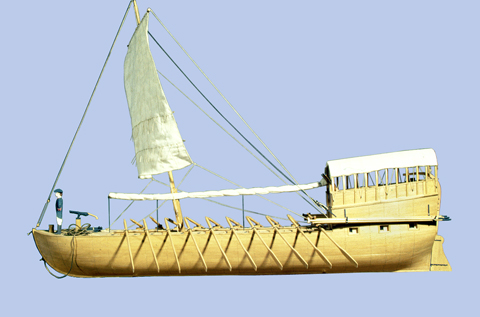The month of May finds the expedition still at their winter camp at River Dubois, the present Wood River across the Mississippi from St. Louis. An attempt is made to tilt the barge to one side so that its bottom can be inspected.
Heeling the Barge
Some fog this morning Several Country people arive I attempt to [Heel] the boat
—William Clark
Working from William Clark’s detailed plan and profile drawings and accompanying notes as well as references scattered throughout the journals, and with a thoughtful review of scant contemporary documentations and recent historical interpretations, nautical historian Richard Boss created models of the barge (called the boat, barge, and bateau but never the keelboat) and the “red” and “white” pirogues, as well as samples of two of their dugout canoes plus a Coastal Indian canoe that the captains acquired on the lower Columbia River. Boss built his models at a scale of one-half inch to the foot.
He gave all of them to the Fort Clatsop National Memorial, which eventually placed them on permanent loan to the Lewis and Clark Interpretive Center in Great Falls, Montana. With the Center’s permission, photographs of Mr. Boss’s models are used to illustrate discussions of those watercrafts on Discovering Lewis & Clark.[1]Richard C. Boss, “Keelboat, Pirogue, and Canoe: Vessels Used by the Lewis and Clark Corps of Discovery,” Nautical Research Journal, Vol. 38, No. 2 (June 1993), 68-87. There have been … Continue reading
Weather Diary
Thermometer at rise
Weather Wind at Rise
Thermometer at 4 oCk. P.M. Weather Wind at 4 oCk. P.M River 28 above fair S E 62 above fair N. E. fall 4 ½ in. —Meriwether Lewis[2]To assist the reader, the editor of this web page has omitted the date column, merged the “River” columns, and spelled out some abbreviations.
Experience the Lewis and Clark Trail
The Lewis and Clark Trail Experience—our sister site at lewisandclark.travel—connects the world to people and places on the Lewis and Clark Trail.
Plan a trip related to May 1, 1804:

Winter Camp at Wood River (Camp Dubois) is a High Potential Historic Site along the Lewis and Clark National Historic Trail managed by the U.S. National Park Service. The site, near Hartford, Illinois, is managed as Lewis and Clark State Historic Site and is open to the public.
Notes
| ↑1 | Richard C. Boss, “Keelboat, Pirogue, and Canoe: Vessels Used by the Lewis and Clark Corps of Discovery,” Nautical Research Journal, Vol. 38, No. 2 (June 1993), 68-87. There have been other reconstructions of the expedition’s flagship all of which drew international attention during the Bicentennial observance: Butch Bouvier, L&C Replicas in Onawa, Iowa; the Lewis & Clark Exploratory Center of Charlottesville, Virginia; the Lewis and Clark State Historical Site, Hartford, Illinois; the Lewis & Clark Boat House and Nature Center, St. Charles, Missouri; and the Missouri Valley Legacy Center, Bismarck, North Dakota. |
|---|---|
| ↑2 | To assist the reader, the editor of this web page has omitted the date column, merged the “River” columns, and spelled out some abbreviations. |



